Основы конституционного строя РФ
1. Выбор языкового сопровождения
РусскийАнглийский
Французский
Русский и английский
Русский и французский
Выход
Y.Zemskov© /Ю.Земсков©
2.
АКАДЕМИЯ УПРАВЛЕНИЯ МВД РоссииКафедра государственно-правовых дисциплин
ОСНОВЫ КОНСТИТУЦИОННОГО СТРОЯ
РОССИЙСКОЙ ФЕДЕРАЦИИ
Москва - 2010
Y.Zemskov©/ Ю.Земсков©
3.
ACADEMY OF MANAGEMENT OF THE MINISTRY OFTHE INTERIOR OF RUSSIA
Chair of state law disciplines
BASES OF THE CONSTITUTIONAL SYSTEM
OF THE RUSSIAN FEDERATION
Moscow - 2010
Y.Zemskov©/ Ю.Земсков©
4.
L'ACADÉMIE DE LA GESTION DU MINISTÈRE DESAFFAIRES INTÉRIEURES DE LA RUSSIE
La chaire des disciplines d'État juridiques
LES BASES DE L'ORDRE CONSTITUTIONNEL
DE LA FÉDÉRATION RUSSE
Moscou - 2010
Y.Zemskov©/ Ю.Земсков©
5. Общие положения
В соответствии с главой 1 Конституции РФ «Основы конституционногостроя РФ» к основным принципам конституционного строя относятся:
признание человека, его прав и свобод высшей ценностью
народовластие
республиканская форма правления
правовое государство
государственный суверенитет РФ
федерализм
разделение властей
единое, равное и свободное гражданство
социальное государство
свобода экономической деятельности
идеологическое и политическое многообразие
светское государство
признание и гарантированность местного самоуправления
6. General provisions
According to chapter 1 of the Constitution of the RussianFederation «Basis of the constitutional system of the
Russian Federation» main principles of the constitutional
system concern:
A recognition of the person, his/her rights and freedom a
supreme value
Democracy
A republican form of government
A lawful state
The state sovereignty of the Russian Federation
Federalism
Division of the authorities
Uniform, equal and free citizenship
The social state
Economic activities freedom
Ideological and political variety
The secular state
Recognition and local government guarantee
7. Les généralités
Conformément au chapitre 1 de la Constitution de la Fédérationde Russie «la Base de l'ordre constitutionnel de la Fédération de
Russie» aux principes de base de l'ordre constitutionnel se
rapportent :
La reconnaissance de la personne, ses droits et les libertés par
la valeur supérieure
La démocratie
Le mode de gouvernement républicain
L'État de droit
La souveraineté nationale de la Fédération de Russie
Le fédéralisme
La division des pouvoirs
La nationalité commune, égale et libre
D'état social
La liberté de l'activité économique
La diversité idéologique et politique
D'état laïque
La reconnaissance et garantie de la gouvernance locale
8. Понятие конституционного строя
Конституционный строй - это система общественных о9. Concept of the constitutional system
C o n c e p t o f t h e c o n s ti t u ti o n a l s y s t e mThe constitutional system is the system of public relation
10. De l'ordre constitutionnel
L'ordre constitutionnel est un système des rapports11. Признание человека, его прав и свобод высшей ценностью
Признание прав и свобод - это закрепление вКонституции и законах всего объёма прав и свобод,
предусмотренных международно-правовыми актами,
а также неотъемлемых прав и свобод, вытекающих из
концепции естественного права.
Соблюдение
требование
от
органов
государственной власти не только воздерживаться
от любых действий, нарушающих или ущемляющих
права и свободы, но создавать условия для их
реализации.
Защита
это
действия
судебных
и
административных органов по восстановлению
нарушенного права или недопущению такого
нарушения, а также создание системы гарантий
такой защиты.
12. Recognition of the person, its rights and freedom a supreme value
R e c o g n i ti o n o f t h e p e r s o n , i t s r i g h t sand freedom a supreme value
The recognition of the rights and freedom is a fastening in
the Constitution and laws of all volume of the rights and
freedom provided by the international legal certificates,
and also inalienable laws and freedom following from the
concept of the natural right.
Observance - the requirement from public authorities not
only to abstain from any actions breaking or striking the
rights and freedom, but to create conditions for their
realisation.
Protection are actions of judicial and administrative
bodies on restoration of the broken right or a nonadmission of such infringement, and also creation of
system of guarantees of such protection.
13. La reconnaissance de la personne, ses droits et les libertés par la valeur supérieure
La reconnaissance des droits et les libertés est unefixation dans la Constitution et les lois de tout le volume
des droits et les libertés prévues par les actes
internationaux juridiques, ainsi que les droits inaliénables
et les libertés découlant de la conception du droit naturel.
L'observation - l'exigence des organismes du pouvoir
d'État non seulement s'abstenir de n'importe quelles
actions violant ou lésant les droits et les libertés, mais
réunir les conditions pour leur réalisation.
La protection sont des actions des organismes judiciaires
et administratifs de la restitution du droit violé ou
l'inadmission d'une telle violation, ainsi que la création
du système des garanties d'une telle protection.
14. Народовластие (демократия)
Народовластие – это принадлежность всей власти народу, атакже свободное осуществление народом власти в полном
соответствии с его волей и интересами.
Непосредственная
(прямая)
демократия
форма
волеизъявления народа, при которой граждане сами
принимают участие в решении государственных дел; это
высшее непосредственное выражение власти народа.
Выборы - это участие граждан в осуществлении власти
посредством выбора путем голосования представителей для
выполнения в органах государственной власти или органах
местного самоуправления принадлежащих им функций по
осуществлению властных полномочий в соответствии с волей
и интересами народа.
Референдум - это голосование граждан РФ по
законопроектам, действующим законам и другим наиболее
важным вопросам государственной и общественной жизни.
Представительная демократия - это осуществление народом
власти через избранных ими представителей, которые
принимают решения, выражающие волю народа.
15. Democracy
Democracy is an accessory of all power to the people, and alsofree realisation by the power people in full conformity with their
will and interests.
Direct democracy - the form of will of the people at which citizens
take part in the decision of state affairs - this higher direct
expression of the power of the people.
Elections are a participation of citizens in realisation of the power
by means of a choice by voting of representatives for
performance in public authorities or local governments of
functions belonging to them on realisation of imperious powers
according to will and interests of the people.
The referendum is a voting of citizens of the Russian Federation
by bills, laws in force and other most important questions of the
state and public life.
Representative democracy is a realisation by the power people
through the elite them of representatives whom the decisions
expressing will of the people make.
16. La démocratie et les libertés par la valeur supérieure
La démocratie(le pouvour des gens) est une appartenance de toutle pouvoir au peuple, ainsi que la réalisation libre par le peuple
du pouvoir en pleine conformité avec sa volonté et les intérêts.
La démocratie - directe (directe) la forme de l'acte de la volonté
du peuple, à qui les citoyens eux-mêmes prennent part à la
décision des affaires d'État; cette expression supérieure directe
du pouvoir du peuple.
Les élections sont une participation des citoyens à la réalisation
du pouvoir au moyen du choix par voie du vote des représentants
pour l'exécution dans les organismes du pouvoir d'État ou les
administrations autonomes locales des fonctions leur
appartenant de la réalisation des responsabilités impérieuses
conformément à la volonté et les intérêts du peuple.
Le référendum est un vote des citoyens de la Fédération de Russie
selon les projets de loi, les lois agissant et d'autres plus
importantes questions d'État et la vie publique.
La démocratie représentative est une réalisation par le peuple du
pouvoir dans les représentants élus eux, qui prennent les
décisions exprimant la volonté du peuple.
17. Виды форм правления
Форма правления18. Kinds of forms of government
Form of government19. Les aspects des modes de gouvernement
Le mode de gouvernement20. Понятие и признаки правового государства
Понятие21. Concept and lawful state signs
Concept22. La notion et les signes de l'État de droit
La noti on et les signes de l'État de droitLa notion
23. Государственный суверенитет РФ
Го с у д а р с т в е н н ы й с у в е р е н и т е т Р ФГосударственный суверенитет - это свойство государства
самостоятельно и независимо от власти других государств
осуществлять свои функции на своей территории и проводить
независимую политику в международных отношениях.
Верховенство - это такое состояние государственной власти,
при которой над ней не стоит и не может стоять никакая
другая власть.
Единство государственной власти - выражается в наличии
единой системы государственных органов, действующих на
основе и в соответствии с КРФ и законами РФ и составляющих
в своей совокупности высшую государственную власть.
Независимость государственной власти проявляется в
самостоятельном выборе форм и методов проведения
внутренней и внешней политики.
24. The state sovereignty of the Russian Federation
The state sovereignty is a property of the state independentlyand irrespective of the power of other states to carry out the
functions in the territory and to carry out independent to the
policy in the international relations.
The leadership is such condition of the government at which over
this power it is not not necessary and there can be no other
power.
The unity of the government is expressed available uniform
system of the state structures operating on a basis and according
to the Constitution of the Russian Federation and laws of the
Russian Federation and components in the set the higher
government.
Independence of the government is shown in an independent
choice of forms and methods of carrying out internal and foreign
policy.
25. La souveraineté nationale de la Fédération de Russie
La souveraineté nationale est une propriété de l'Étatindépendamment et indépendamment du pouvoir des autres
États de réaliser les fonctions sur le territoire et suivre la
politique indépendante sous les relations internationales.
La prééminence est un tel état du pouvoir d'État, à qui sur elle ne
se trouve pas et il n'y avoir pas se trouver aucun autre pouvoir.
L'unité du pouvoir d'État - s'exprime dans la présence du système
commun des administrations agissant à la base et conformément
à la constitution de la Fédération de Russie de les lois de la RF et
les composantes dans l'ensemble le pouvoir d'État supérieur.
L'indépendance du pouvoir d'État se manifeste dans le choix
indépendant des formes et les méthodes de la tenue intérieur et
la politique étrangère.
26. Понятие и принципы федерализма
Понятие27. Concept and federalism principles
Concept28. La notion et les principes du fédéralisme
La noti on et les principes du fédéralismeL a n o ti o n
29. Принцип разделения властей
30. Principle of division of the authorities
Principle of division of the authoriti es31. Le principe de la division des pouvoirs
32. Единое, равное, свободное гражданство РФ
Гражданство - устойчивая правовая связь человека сгосударством, выражающаяся в совокупности их
взаимных прав, обязанностей и ответственности,
основанная на признании и уважении достоинства,
основных прав и свобод человека
Принципы гражданства РФ:
единое
равное независимо от оснований приобретения
принцип невозможности лишения гражданства
гражданина России
33. Uniform, equal, free citizenship of the Russian Federation
Uniform, equal, free citi zenship of theRussian Federati on
Citizenship is steady legal communication of the person
with the state, expressed in aggregate their mutual
rights, duties and the responsibility, based on a
recognition and respect of advantage, fundamental laws
and freedom of the person.
Principles of citizenship of the Russian Federation:
•The uniform
•Equal irrespective of the acquisition bases
•A principle of impossibility of deprivation of citizenship
of the citizen of Russia
34. La nationalité commune, égale libre de la Fédération de Russie
L a n a ti o n a l i t é c o m m u n e ,d e l a F é d é r a ti o n d e
égale libre
Russie
La nationalité - le lien de droit stable de la personne
avec l'État, exprimant au total leurs droits mutuels, les
devoirs et la responsabilité, fondé sur la reconnaissance
et le respect de la dignité, les droits principaux et les
libertés de la personne.
Les principes de la nationalité de la Fédération de
Russie:
•Le commun
•Égal indépendamment des raisons de l'acquisition
•Le principe de l'impossibilité de la privation de la
nationalité du citoyen de la Fédération de Russie
35. Социальное государство
Со ци аль но е го сударс тво36. The social state
37. L'État social
38. Свобода экономической деятельности
39. Economic activities freedom
E c o n o m i c a c ti v i ti e s f r e e d o m40. La liberté de l'activité économique
L a l i b e r t é d e l ' a c ti v i t é é c o n o m i q u e41. Идеологическое и политическое многообразие
Идеология – это система политических, правовых,экономических,
этических,
религиозных
идей,
воззрений, взглядов на устройство общества и
государства, на отношения людей между собой, на
положение личности в обществе и государстве.
Идеологическое многообразие - право каждого
человека, группы людей, их объединений свободно
развивать свои теории и воззрения, распространять и
защищать их, работать активно над практическим
осуществлением своих идей.
Политическое многообразие- наличие разнообразных
направлений в политической жизни общества.
Политическое многообразие - наличие разнообразных
направлений в политической жизни общества
42. Ideological and political variety
I d e o l o g i c a l a n d p o l i ti c a l v a r i e t yThe ideology is a system of political, legal, economic,
ethical, religious ideas, views, sights at a society
organisation and the state, on relations of people among
themselves, on position of the person in a society and the
state.
Ideological variety is the right of each person, group of
people, their associations freely to develop the theories
and views, to extend and protect them, to work actively
over practical realisation of the ideas.
Political variety is a presence of various directions in a
political life of a society.
43. La diversité idéologique et politique
L a d i v e r s i t é i d é o l o g i q u e e t p o l i ti q u eL'idéologie est un système des idées politiques, juridiques,
économiques, morales religieuses, les manières de voir, les
regards sur l'installation de la société et l'État, sur les
relations des gens entre elle-même, sur la position de la
personnalité dans la société et l'État.
La diversité idéologique - le droit de chaque personne, le
groupe des gens, leurs groupements de développer
librement les théories et les manières de voir, les répandre
et protéger, travailler est actif sur la réalisation pratique
des idées.
La diversité politique - la présence des diverses directions
dans la vie politique de la société.
44. Идеологическое и политическое многообразие
Политическаяпартия
это
добровольное,
самоуправляемое, некоммерческое формирование,
созданное по инициативе граждан РФ, целью которого
является участие в выборах в органы государственной
власти посредством выдвижения кандидатов, а также
осуществление
государственной
власти
через
представительные органы.
Многопартийность
означает
признанную
Конституцией возможность существования в России
партий с различными политическими взглядами.
Общественное объединение - добровольное,
самоуправляемое, некоммерческое формирование,
созданное по инициативе граждан, объединившихся на
основе общности интересов для реализации общих
целей,
указанных
в
уставе
общественного
объединения.
45. Ideological and political variety
I d e o l o g i c a l a n d p o l i ti c a l v a r i e t yThe political party is the voluntary, homing,
noncommercial formation created at the initiative of
citizens of the Russian Federation which purpose is
participation in elections in public authorities by means of
promotion of candidates, and also government realisation
through representative bodies.
Multi-party system means the possibility of existence of
political parties recognised as the Constitution with various
political views in Russia.
Public association is voluntary, homing, noncommercial
formation created at the initiative of citizens, the interests
which have united on the basis of a generality for
realisation of the overall aims specified in the charter of
public association.
46. La diversité idéologique et politique
L a d i v e r s i t é i d é o l o g i q u e e t p o l i ti q u eLa formation politique est la formation volontaire,
autonome non commerciale créée à l'initiative des citoyens
de la Fédération de Russie, le but de qui est la participation
aux élections aux organismes du pouvoir d'État au moyen
de la présentation des candidats, ainsi que la réalisation du
pouvoir d'État dans les organismes représentatifs.
Le multipartisme - signifie la possibilité reconnue pour la
Constitution de l'existence en Russie des partis avec de
divers points de vue politiques.
L'union publique - la formation volontaire, autonome non
commerciale créée à l'initiative des citoyens, uni à la base
de la solidarité pour la réalisation des objectifs communs
indiqués dans le statut de l'union publique.
47. Светское государство
Св етс ко е гос уда рс тво48. The secular state
49. L'État laïque
50. Признание и гарантированность местного самоуправления
Признание иместного
гарантированность
самоуправления
51. Recognition and local government guarantee
R e c o g n i ti o n a n d l o c a l g o v e r n m e n tguarantee
52. La reconnaissance et la garantie de la collectivité
L a r e c o n n a i s s a n c e e t l a g a r a n ti e d el a c o l l e c ti v i t é
53. Права и свободы человека и гражданина в Российской Федерации
Права человека - это права, принадлежащие людямнезависимо от наличия или отсутствия гражданства, они
обеспечивают свободу и безопасность личности.
Права граждан - это права личности, обусловленные
принадлежностью к гражданству, эти права обычно
предполагают возможность участия человека в
управлении делами государства.
Конституционная обязанность - это установленные
Конституцией вид и мера должного поведения личности.
Конституционно-правовой статус личности - совокупность
конституционных прав, свобод и обязанностей человека
и гражданина.
54. The rights and freedom of the person and the citizen in the Russian Federation
Human rights are the rights belonging to peopleirrespective of presence or absence of citizenship, they
provide freedom and safety of the person.
The rights of citizens are the rights of the person caused
by an accessory to citizenship, these rights usually
assume possibility of participation of the person in a state
administrative office.
The constitutional duty are the established kind and a
measure of due behaviour of the person the Constitution.
The constitutional legal status of the person is a set of
constitutional laws, freedom and duties of the person and
the citizen.
55. Les droits et les libertés de la personne et le citoyen en Fédération de Russie
Les droits de la personne sont les droits appartenant auxgens indépendamment de la présence ou l'absence de la
nationalité, ils assurent la liberté et la sécurité de la
personnalité.
Les droits des citoyens sont des droits de la personnalité
conditionné par l'appartenance à la nationalité, ces droits
supposent d'habitude la possibilité de la participation de
la personne dans le secrétariat de l'État.
Le devoir constitutionnel sont un aspect établis par la
Constitution et la mesure de la conduite nécessaire de la
personnalité.
Le statut constitutionnellement-juridique de la
personnalité - l'ensemble des droits constitutionnels, les
libertés et les devoirs de la personne et le citoyen.
56. Конституционные принципы осуществления прав и свобод в Российской Федерации
всеобщность и неотчуждаемость прав и свобод человекапризнание прав и свобод человека и гражданина в
соответствии с международным правом
непосредственное действие прав и свобод
равенство всех перед законом и судом
равенство прав и свобод человека и гражданина независимо
от
пола,
расы,
национальности,
имущественного,
должностного положения, места жительства, отношения к
религии, убеждений, принадлежности к общественным
организациям, а также других обстоятельств
равенство прав и свобод мужчин и женщин
возможность ограничения прав и свобод только в целях,
установленных Конституцией РФ
57. The constitutional principles of realisation of the human rights and freedom in the Russian Federation
Generality and not deprivation of the human rights and freedomRecognition of the rights and freedom of the person and the
citizen according to international law Direct action of the human
rights and freedom
Equality of all before the law and court
Equality of the human rights and freedom irrespective of a sex,
races, nationalities, property, official position, a residence, the
relation to religion, belief, an accessory to public organisations,
and also other circumstances
Equality of the rights and freedom of men and women
Possibility of restriction of the human rights and freedom only
with a view of the Russian Federations established by the
Constitution
58. Les principes constitutionnels de la réalisation des droits et les libertés en Fédération de Russie
La généralité et l'inaliénabilité des droits et les libertés de lapersonne
La reconnaissance des droits et les libertés de la personne et le
citoyen conformément au droit international
L'action directe des droits et les libertés
L'égalité de tous devant la loi et la cour
L'égalité des droits et les libertés de la personne et le citoyen
indépendamment du plancher, les races, les nationalités,
patrimonial, la qualité officielle, les résidences, les relations à la
religion, les persuasions, les appartenances aux organisations de
masse, ainsi que d'autres circonstances
L'égalité des droits et les libertés des hommes et les femmes
La possibilité de la restriction des droits et les libertés seulement
dans les buts établis par la Constitution de la Fédération de Russie
59. Классификация прав и свобод человека и гражданина
60. Classification of the human rights and freedom
61. La classification des droits et les libertés de la personne et le citoyen
62. Личные права и свободы
63. The person’s rights and freedom
T h e p e rs o n ’s r i g h t s a n d f r e e d o m64. Les droits personnels et les libertés
65. Политические права и свободы
66. The political rights and freedom
T h e p o l i ti c a l r i g h t s a n d f r e e d o m67. Les droits politiques et les libertés
L e s d r o i t s p o l i ti q u e s e t l e s l i b e r t é s68. Экономические права
69. The economic rights
70. Les droits économiques
71. Социальные права
Право на благоприятную окружающую сре72. The social rights
73. Les droits sociaux
74. Культурные права и свободы
Свобода литературн75. The cultural rights and freedom
76. Les droits culturels et les libertés
77. Конституционные обязанности человека и гражданина
78. The constitutional person’s and citizen’s duties
79. Les devoirs constitutionnels de la personne et le citoyen
L e s d e v o i r s c o n s ti t u ti o n n e l s d e l apersonne et le citoyen
Chacun est engagé à payer les imp
80. Федеративное устройство России
81. The federal device of Russia
82. La structure fédérative de la Russie
L a s t r u c t u r e f é d é r a ti v e d e l a R u s s i e83. Конституционно-правовой статус Российской Федерации
Элементы конституционно-правового статуса:наличие собственной конституции
территория, складывающаяся из территорий
субъектов федерации являющаяся сферой
распространения суверенитета РФ
единое гражданство
единая система органов государственной власти
единая федеральная правовая система
государственная собственность
единая денежная и кредитная система
наличие Вооруженных сил РФ
русский язык - государственный язык
РФ - субъект международных отношений
государственная символика
84. The constitutional legal status of the Russian Federation
T h e c o n s ti t u ti o n a l l e g a l s t a t u s o ft h e R u s s i a n F e d e r a ti o n
Elements of the constitutional legal status:
Presence of own constitution
The territory developing of territories of subjects of
federation being sphere of distribution of the sovereignty
of the Russian Federation
Uniform citizenship
Uniform system of public authorities
Uniform federal legal system
State ownership
Uniform monetary and credit system
Presence of Armed forces of the Russian Federation
Russian - a state language
The Russian Federation - the subject of the
international relations
The state symbolics
85. Le statut constitutionnellement-juridique de la Fédération de Russie
Le statut consti tuti onnellement-juridiquede la Fédérati on de Russie
Les éléments du statut constitutionnellement-juridique :
La présence de la constitution personnelle
Le territoire se formant des territoires des sujets de la
fédération étant sphère de la diffusion de la
souveraineté de la Fédération de Russie
La nationalité commune
Le système commun des organismes du pouvoir d'État
Le régime juridique commun fédéral
La propriété de l'État
Le système commun monétaire et de crédit
La présence des Forces armées de la Fédération de
Russie
La langue russe - la langue nationale
La Fédération de Russie - le sujet des relations
internationales
La symbolique d'État
86. Конституционно-правовой статус субъектов Российской Федерации
Ко н с т и т у ц и о н н о - п р а в о в о й с т а т ус с у б ъ е к т о вРо с с и й с ко й Ф ед е р а ц и и
Субъект Федерац
87. The constitutional legal status of subjects of the Russian Federation
T h e c o n s ti t u ti o n a l l e g a l s t a t u s o fs u b j e c t s o f t h e R u s s i a n F e d e r a ti o n
The subject of Federation - the state
88. Le statut constitutionnellement-juridique des sujets de la Fédération de Russie
89. Административно-территориальное устройство
90. The administrative territorial device
T h e a d m i n i s t r a ti v e t e r r i t o r i a l d e v i c e91. L'installation D'administration territoriale
L ' i n s t a l l a ti o n D ' a d m i n i s t r a ti o nterritoriale
92. Президент
Основные функции Президента РФ93. The president
The basic functions of the President of the Russian94. Le président
Les fonctions principales du Président de la Fédéra95.
96.
97.
98.
99.
100.
101.
102.
103.
104.
ФедеральноеГосударственная
Собрание
думаРоссийской Федерации
105.
FederalThe State
meeting
Duma
of the Russian Federation
106.
L a Ré u n i o n fé d é ra l e d e l a Fé d é rati o n107. Законодательный процесс
108. Legislative process
L e g i s l a ti v e p r o c e s s109. Le procès législatif
L e p r o c è s l é g i s l a ti f110. Правительство Российской Федерации
111. The government of the Russian Federation
The government of the Russian Federati onThe government of the Russian F
112. Le gouvernement de la Fédération de Russie
Le gouvernement de la Fédérati onde Russie
113.
Структурафедеральные
Правительства
министерства
РФ
114.
StructureFederalofministries
the Government of the Russian Federation
115.
La structureLes ministères
du gouvernement
fédéraux
de la Fédération de Russi
116.
117.
118.
119.
АктыПостановления
Правительства Российской Федерации
120.
CertificatesDecisionsof the Government of the Russian Federatio
121.
LesLactese s ddu
é cGouvernement
isions
de la Fédération de Russie
122.
123.
Federal courts124.
Les Tribunaux fédéraux125.
126.
127.
128. Прокуратура РФ
129. Public Prosecutor’s Office of the Russian Federation
130. Le ministère public de la Fédération de Russie
L e m i n i stè re p u b l i c d e l a Fé d é rati o n d e R u s s i e131. Местное самоуправление в Российской Федерации
132. Local government in the Russian Federation
Local government in the Russian Federati on133. La gouvernance locale en Fédération de Russie
134. Принципы местного самоуправления
•самостоятельность решения населением вопросовместного значения
•многообразие организационных форм
•законность
•гласность и учет общественного мнения
•соблюдение прав и свобод
•организационная обособленность органов местного
самоуправления от органов государственной власти
•соответствие материальных и финансовых ресурсов
органов местного самоуправления его полномочиям
•ответственность органов местного самоуправления
и их должностных лиц перед населением
•запрет
на
ограничение
прав
местного
самоуправления
135. Local government principles
• Independence of the decision the population ofquestions of local value
• Variety of organizational forms
• Legality
• Publicity and the public opinion account
• Observance of the rights and freedom
• Organizational isolation of local governments from
public authorities
• Conformity material and financial resources of local
governments to their powers
• Responsibility of local governments and their officials
before the population
• An interdiction for restriction of the rights of local
government
136. Les principes de la gouvernance locale
• L'indépendance de la décision par la population desquestions d'intérêt local
• La diversité des formes d'organisation
• La légitimité
• La publicité et le compte de l'opinion publique
• L'observation des droits et les libertés
• L'isolement d'organisation des administrations
autonomes locales des organismes du pouvoir d'État
• La conformité matériel et les ressources financières
des administrations autonomes locales à ses
responsabilités
• La responsabilité des administrations autonomes
locales et leurs fonctionnaires devant la population
• L'interdiction à la restriction des droits de la
collectivité
137. Полномочия местного самоуправления
Полномочия местного самоуправления - это закрепленныеместным законодательством, правовыми актами субъектов РФ,
органов местного самоуправления за населением, выборными
и иными органами права и обязанности, связанные с
реализацией задач и функций местного самоуправления.
Полномочия МСУ:
бюджет и финансы
управление муниципальной собственностью
взаимоотношения
с
предприятиями,
учреждениями,
организациями на территории местного самоуправления
земельные отношения и охрана окружающей среды
строительство,
жилищное
хозяйство,
коммунальное
хозяйство, транспорт и связь
социально-культурное обслуживание населения
охрана общественного порядка, прав и свобод.
138. Powers of local government
Powers of local government are fixed by the local legislation, legalcertificates of subjects of the Russian Federation, local
governments behind the population, elective and other bodies of
the right and the duties connected with realisation of problems
and functions of local government.
Powers of local government:
The budget and the finance
Management of the municipal property
Mutual relations with the enterprises, establishments, the
organisations in local government territory
Ground relations and preservation of the environment
Building, housing and communal services, a municipal services,
transport and communication
Welfare service of the population
Protection of a public order, the rights and freedom
139. Les responsabilités de la gouvernance locale
L e s r e s p o n s a b i l i t é s de la gouvernancelocale
Les responsabilités de la gouvernance locale - locale est fixé par la
législation locale, les actes juridiques des sujets de la Fédération de
Russie, les administrations autonomes locales après la population,
les autres organismes électifs et du droit et les devoirs liés à la
réalisation des tâches et les fonctions de la collectivité.
Les responsabilités de la gouvernance locale :
Le budget et les finances
La gestion de la propriété municipale
Les relations avec les entreprises, les institutions, les organisations
sur le territoire de la collectivité
Les relations foncières et la protection de l'environnement
La construction, l'économie de logement, le service communaux, le
transport et le lien
Les services aux ménages socio-culturels
La protection de l'ordre public, les droits et les libertés






















































































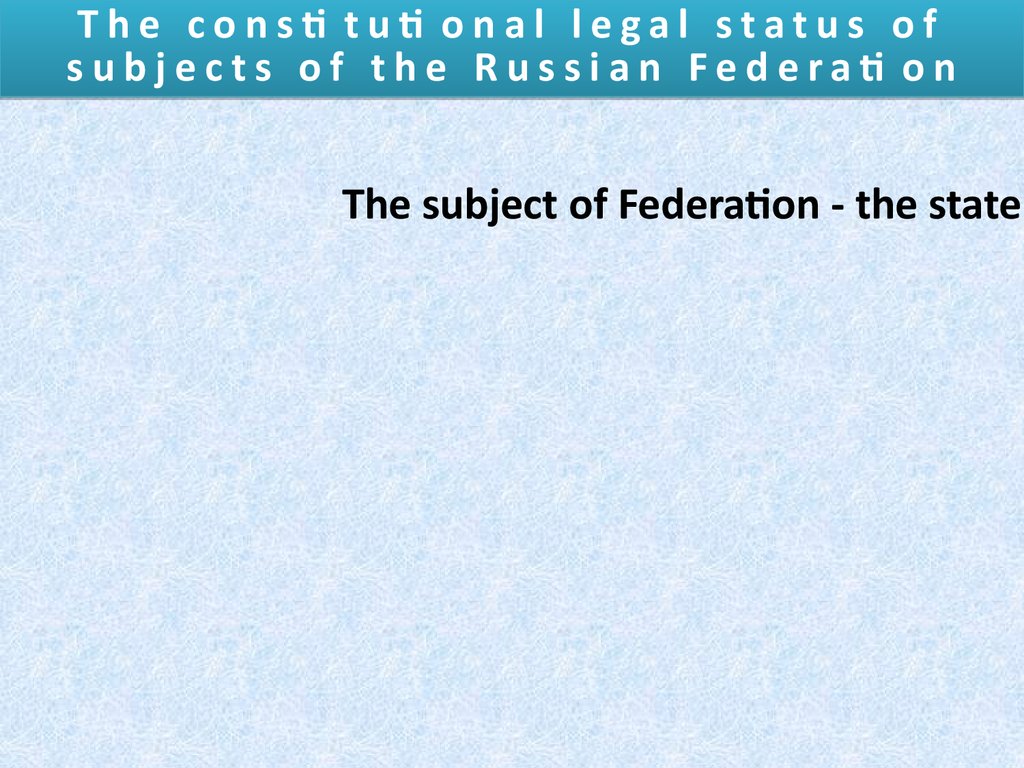


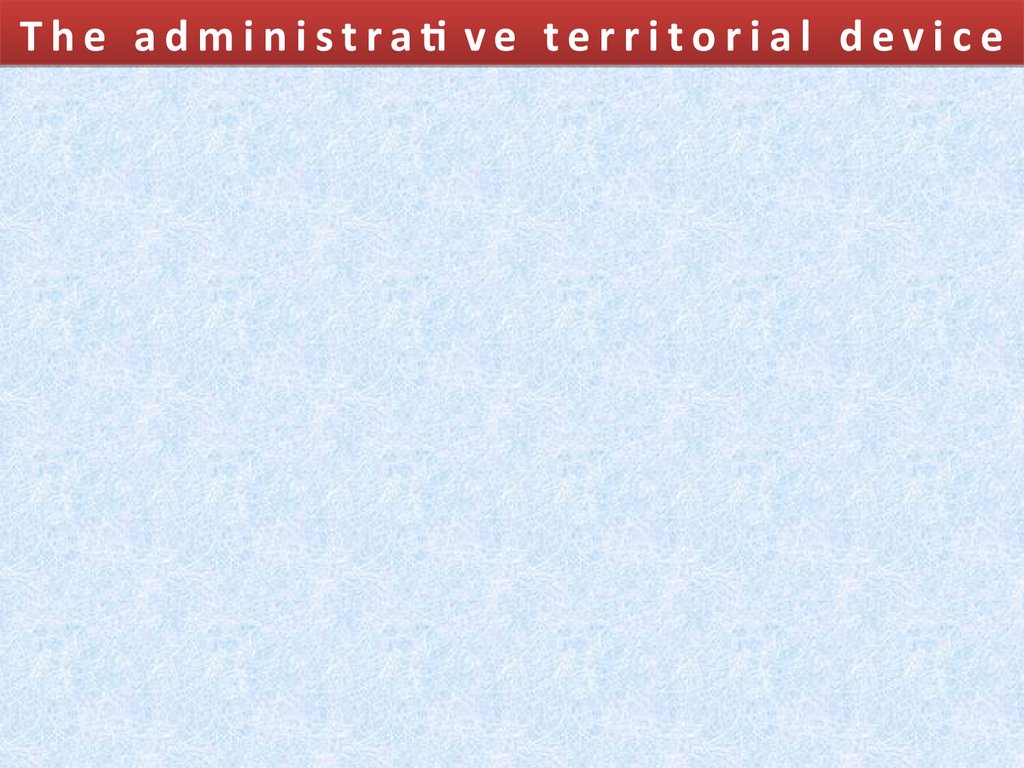















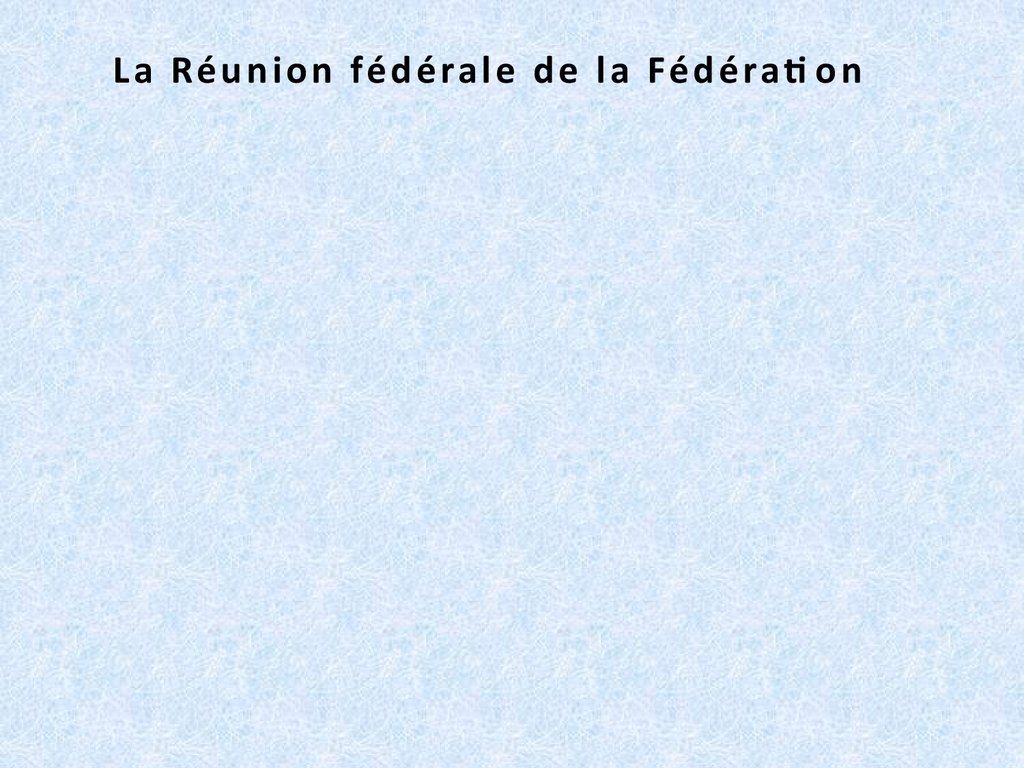







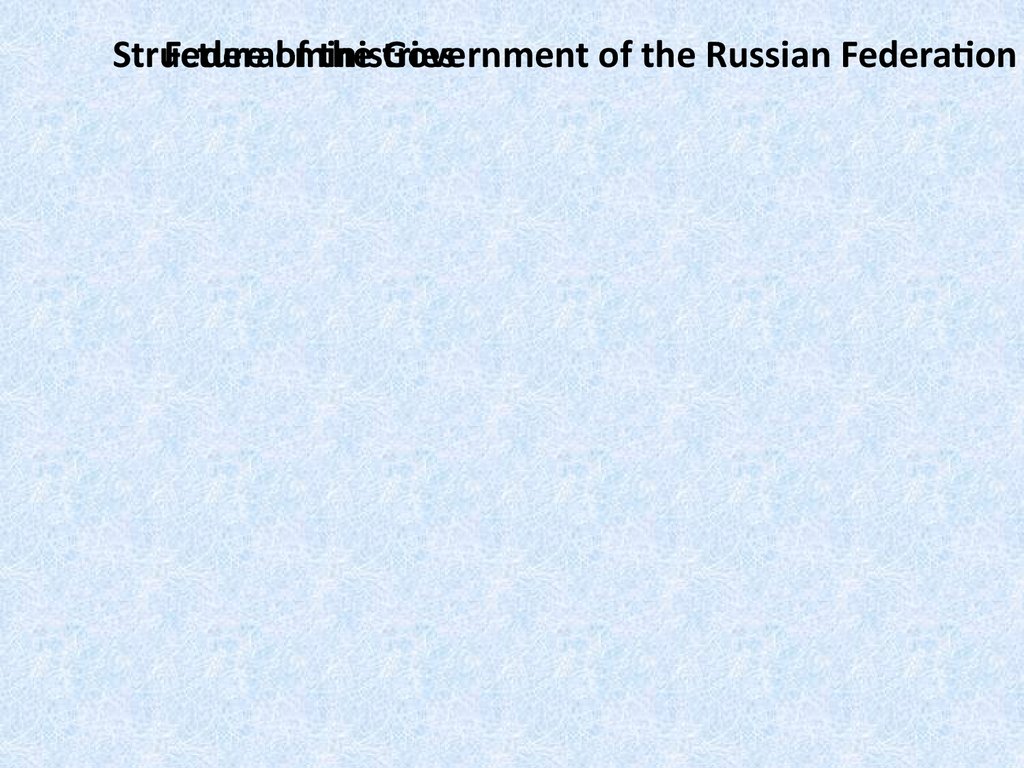
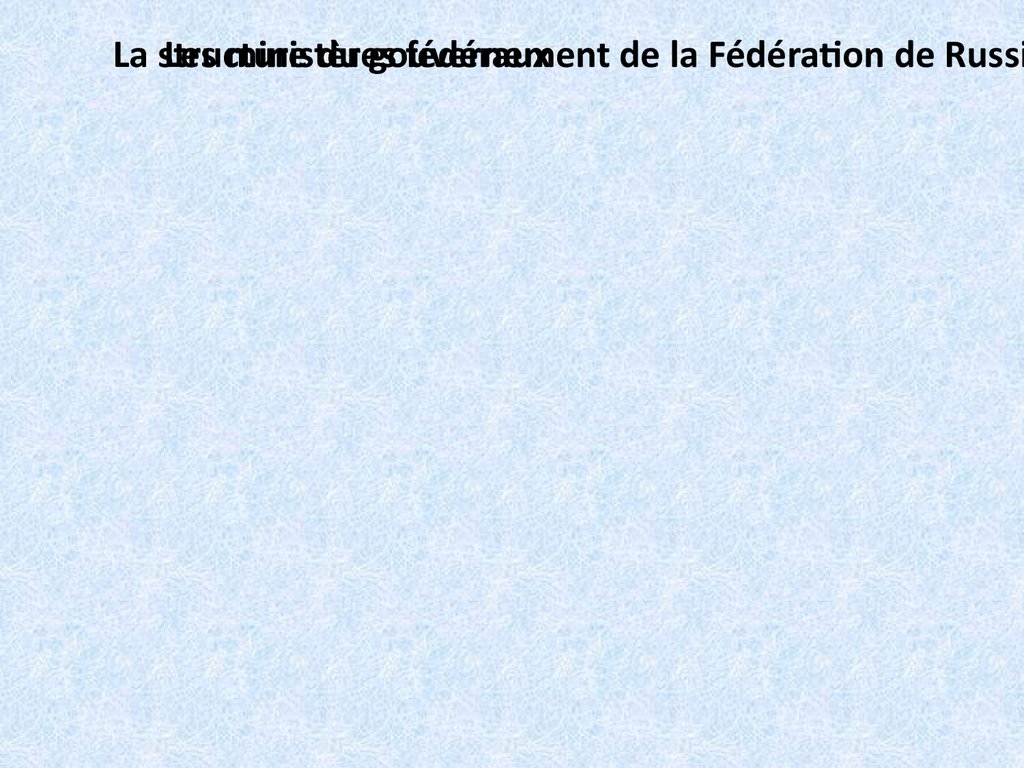



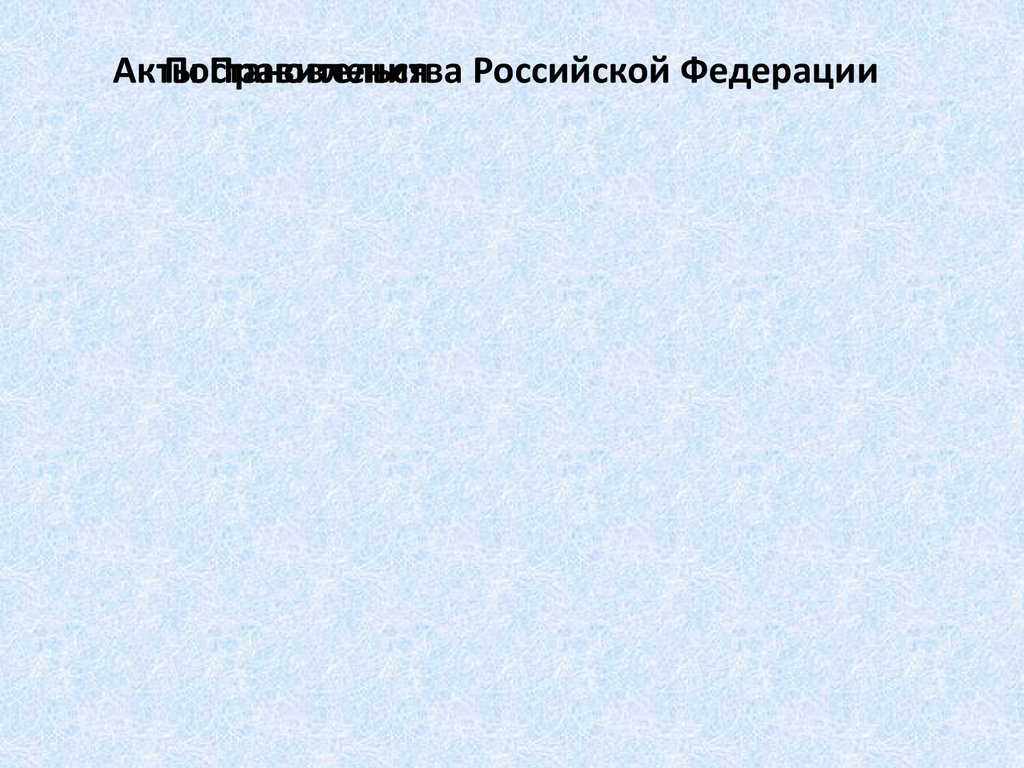



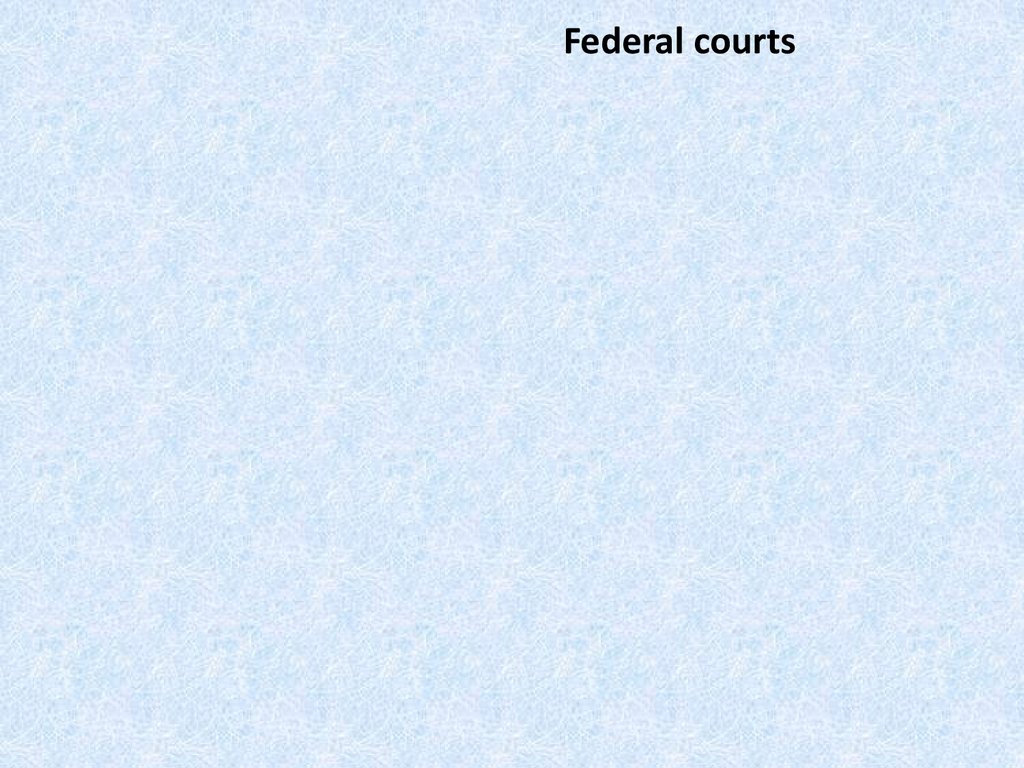





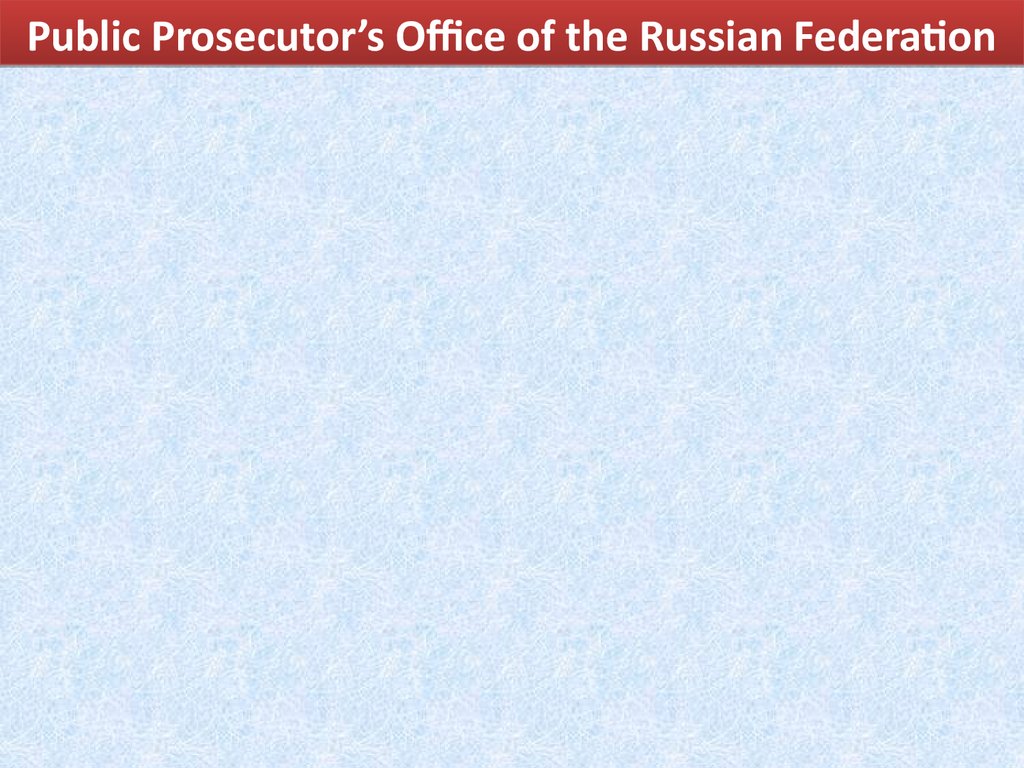
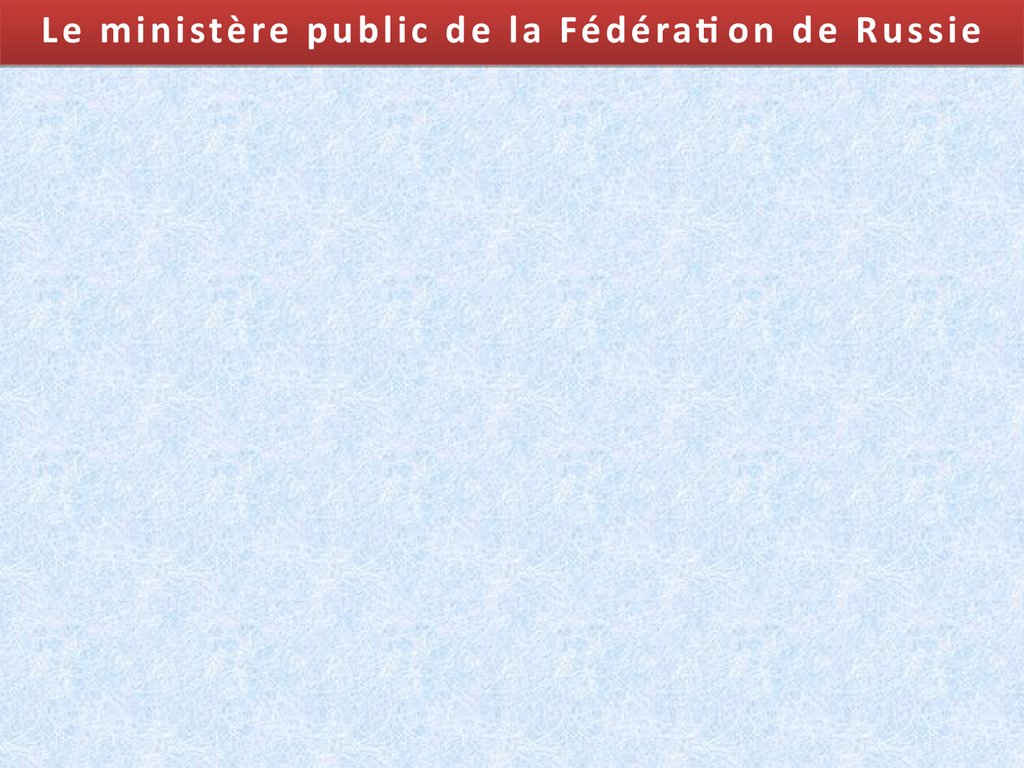
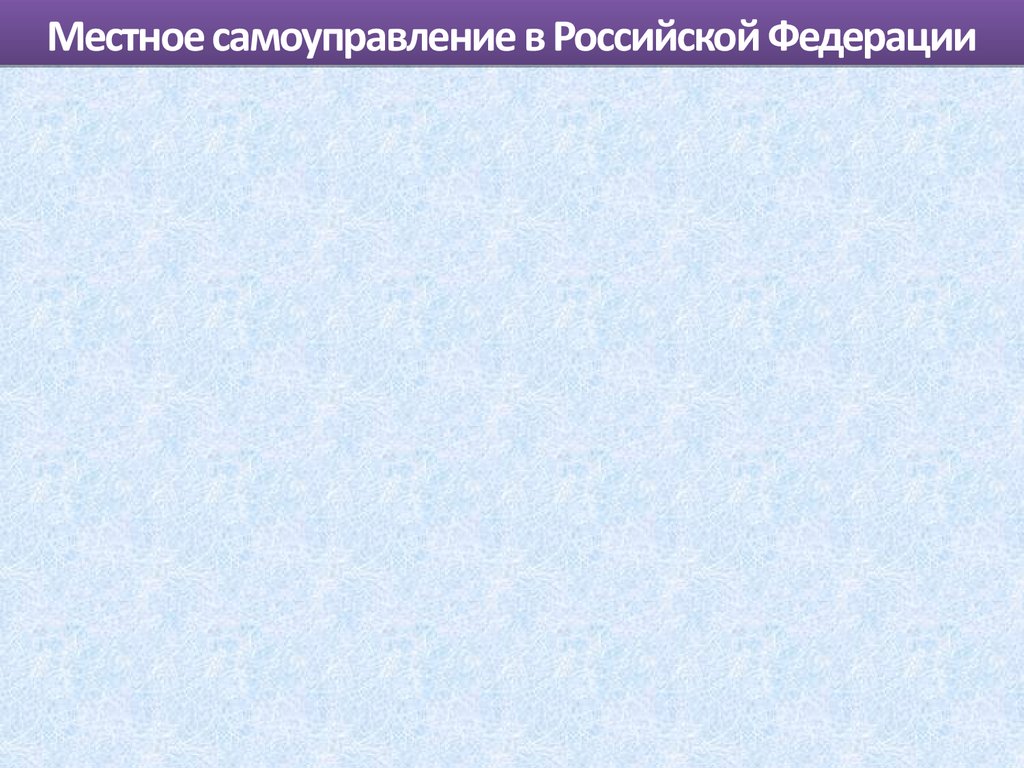


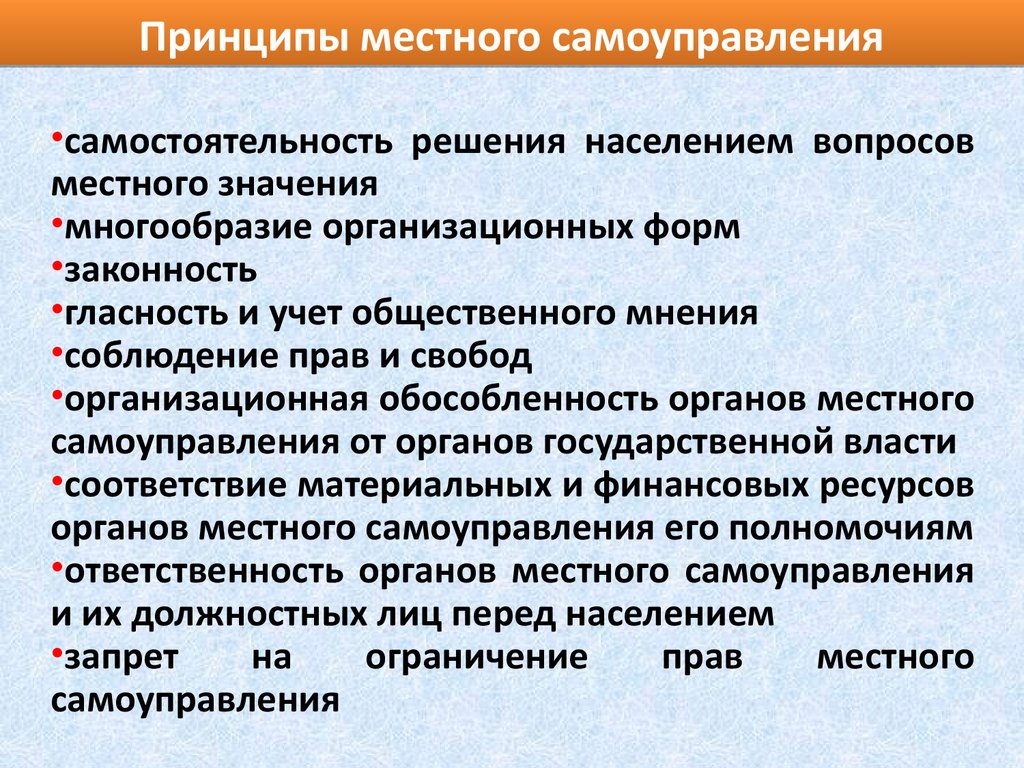


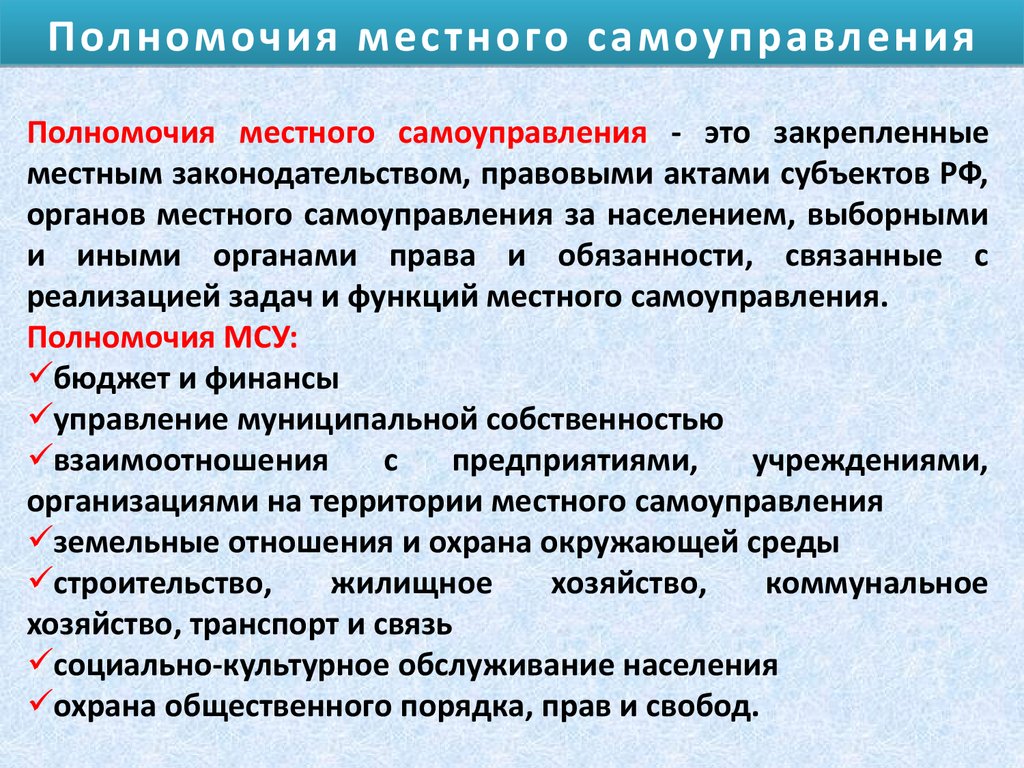
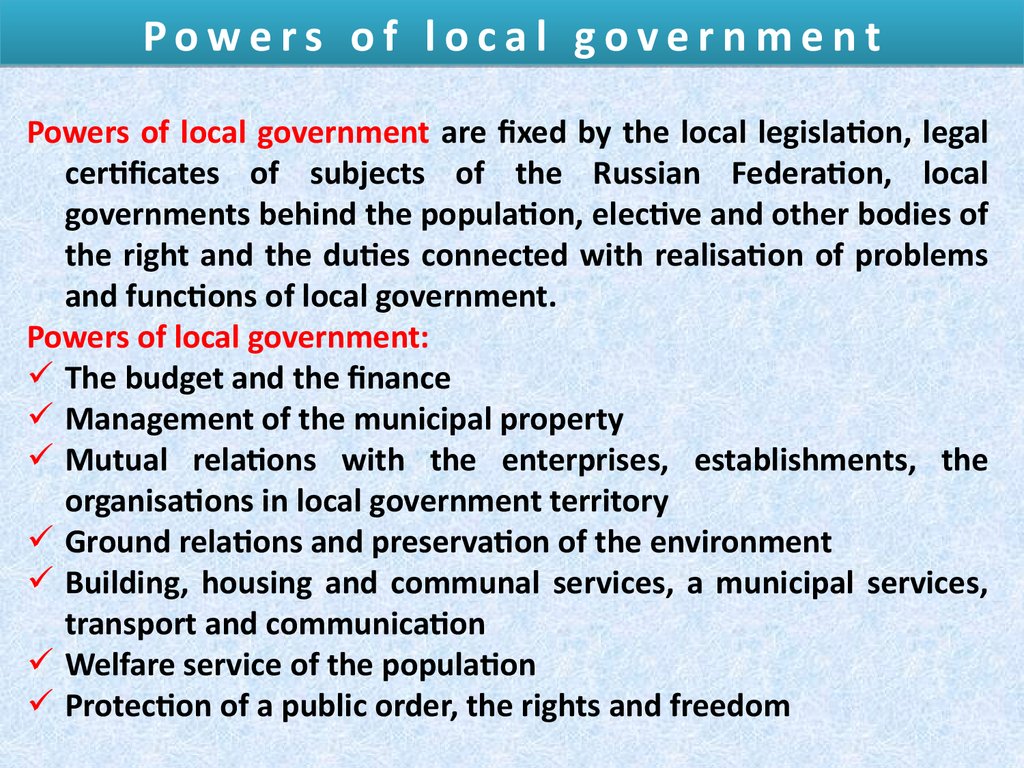




 Право
Право